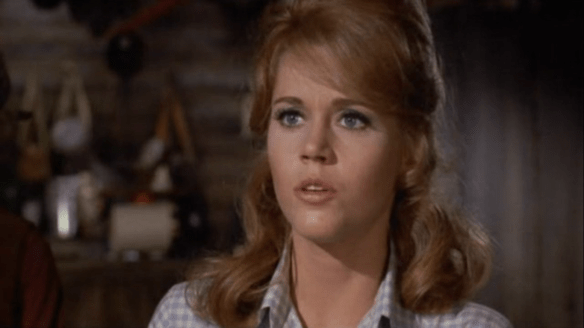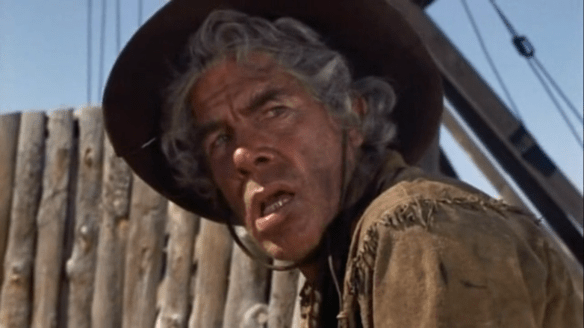When the Columbia statue whips off her toga and comes out with western wear and six shooters, the movie’s intentions are made quite clear. And if that’s not enough Nat King Cole and Stubby Kaye appear on the scene, decked out, strumming their banjos. They become the accompanying bards relating the ballad of Cat Ballou.
To my mind, it’s one of the only moments in Nat King Cole’s movie career where his talents seem used in a more robust way, and it seems like he’s genuinely having a ball sending up the story. He and Stubby have an open line of communication going with the audience becoming one of the film’s primary conduits for comedy.
And of course, the world itself is ripe with screwy antics easily sharing a world with the likes of Support Your Local Sheriff if not Blazing Saddles. It feels like the West is a place filled with all sorts of oddball characters and idiosyncrasies worthy of laughs and a myriad of double-takes.
Jane Fonda was still ascending on her way to becoming one of the ’60s and 1970s most visible performers, and she teems with an undeniable pluckiness in the title role. In its own likable and goofy way, it becomes a picture of empowerment for female heroines.
If hardly a feminist screed, it nevertheless has the kind of charm you might find in an episode of That Girl. It’s Hollywood not quite coming to terms with the full brunt of counter-culture (Ann-Margret was even earmarked for the role).
But if Fonda proves her mettle as a “wanted” outlaw destined to be hung and the leader of a “nefarious” gang of desperados, it’s Lee Marvin who becomes the film’s undisputed attraction. Kid Shelleen is an inspired western hybrid: the restless gunslinger crossed with the town drunk.
He’s got hair like Harpo Marx coiffed under his beat-up hat, hands twitching, married to a bottle, with his disheveled buckskins hanging down to put his long john undergarments on full display. It’s this whole package making Lee Marvin’s performance such a crowd pleaser, but this is only true because it flies in the face of so much of what he made a name for himself doing. He was tough guys, psychos, and henchmen. Here he’s more than game to lie prostrate in the street, falling over his horse, in fits of comedic inebriation.
However, it’s the scene before his auspicious introduction that really brings the picture together. The square dancing sequences become a wonderfully visual merging of characters and arcs all in one place as Cat formulates a plan to help her daddy out: enlisting the help of a gunslinger, or at least a man with a gun. It devolves into glorious chaos as all the men who have been thrown into her life (Michael Callan, Dwayne Hickman, and Tom Nardini) vow to protect the elder Ballou (John Marley) to the best of their abilities.
Cat Ballou is mostly corny, and it works best leaning whole hog into this sentiment. When it tries to be something with the semblance of drama, it doesn’t quite work as if it’s grasping for something outside its comfort zone. Cat loses her father, faces a town complicit in the killing perpetrated by a rival gunman — a silver-nosed murderer (also played by Marvin). Even a storied hero like Butch Cassidy (Arthur Hunnicut) has stuck himself behind a mercantile counter.
Jane Fonda exerts herself pouting and throwing a rock tantrum to get her three male companions to see it her way. The Hole-in-the-Wall gang is revived to acquire their much-needed funds, and they do quite a job of it without a Superposse to chase after them.
These exploits are how Cat Ballou earns notoriety across the Old West although she finds herself before a scaffold for quite a different reason. The gallows humor of the noose going around her gorgeous neck feels like another unbecoming scenario until we slip back into a much-preferred gear of silliness.
Cat Ballou is at its finest as a goofball western, a bit dorky around the edges but no less lovable. It does mystify me how it became such an award-season darling, though it’s not without a few unremitting charms. Its impact on the western mythos feels minor at best if only for Fonda’s spirited heroine in a genre otherwise replete with male heroes.
3.5/5 Stars



It also has one of the funniest one-liners in movie history: “I’ve never seen a man get through the day so fast.”
LikeLiked by 1 person
Pingback: The Hired Hand (1971) | 4 Star Films